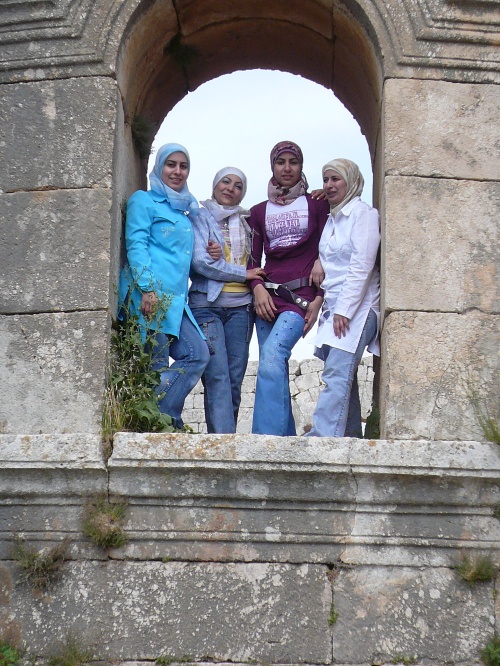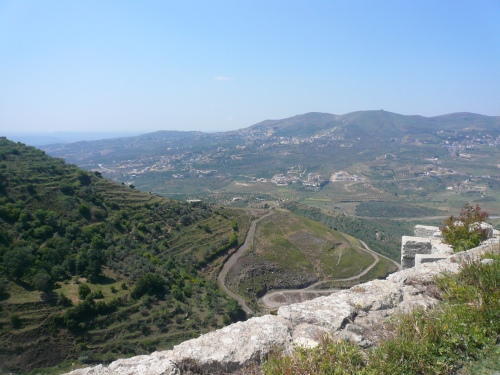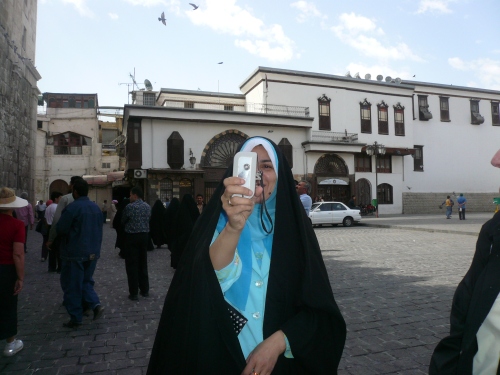Today (July 2013) I read that “about 40 people” had been killed in a rocket attack in Homs; thousands of women and children have died in this Syrian ciivil war. There is fighting in Damascus and Aleppo.

It was so few years ago that his happy family was on the road to Al Bara . Where are they now? I wonder.
There are more than 100,000 estimated deaths in this war so far, nearly 2 million refugees. Chemical weapons have been used. The religious tolerance that appeared to exist in Syria is itself at the heart of the trouble. Allegiances as ever strange to the West emerge – Hezbollah supports Assad; factions of El Qaeda seem to be masquerading as legitimate anti-Government reformists; Iran is sending troops; Russia and the USA assume contrary position; Israel lurks.
This war had gone quietly on for two years destroying lives and a country redolent in history. Is the world suffering “suffering fatigue”? Medicine sans Frontier battles on.
In 2008 I made a brief visit to Syria and was enchanted by the country more than any other I have seen. True you only slide over surfaces as you travel through. Yet the surfaces of Syria were a snapshot of some of the richest history on the planet.

Re-ramped street at Mari, a Mesopotamian Sumerian city from about 3000 BC – one of the oldest of the world’s cities.
From the plains where the Hittites and the Egyptians are said to have had their battle/standoff in 1289 BC to Mesopotamian city ruins at Mari to Hellenic digs and Nabataean walls, and the grand ruins of Roman Palmyra and Bosra…….history’s remnants walk across the Syrian landscape.
Then in the northwest there are the Dead Cities, Byzantine villages that date from the 1st to 7th centuries and were abandoned between the 8th and 10th centuries.
These Dead Cities are probably the most evocative sites in the country. Who were these people and why did they disappear? Seven hundred cities abandoned.
Not long after (in historical counting), Crusader castles capture the popular imagination.

Sometime between the 8th and the 10th century this house and the town it was in, the Dead City of Serjilla, were left abandoned.
This parade of civilisations is accessible and marvellous.
I intended to go back.
I am writing this inadequate and overly long blog
- As a salute to the pre-civil war Syrian people I saw;
- to acknowledge my awe of their history;
- to make some of my myriad photographs available to those who might not know about this fine country pre-war;
- to remember
I apologise if, in the face of the war, writing about a travel experience seems trivial.
It is hard to know how to present a small(ish) selection of the nearly 700 photographs I took….faces or places? in the order I saw them? by standout memories? by historical era?
I have decided to cut and shuffle in a random way, by an idiosyncratic selection of topics that come to me when I reflect on the photos.
Let’s start with some of the people (and hope these ones happy to be photographed remain safe to-day).

Young girls pose in the window at the Basilica St Simeon where the saint was said to have lived for 37 years on a platform atop of a pillar 15 metres high
My Syrian history starts with the settlement at Mari, a Sumerian city-state of Mesopotamia where Western cities began. While the Iraq war did its best to destroy so much of that country’s ancient history, the ruins at Mari were built in the same period, a satellite city to Ur, one of the very earliest.
Syria was where the Egyptians and the Persians met in battle

Tell Nebbi Nemb site where In 1274 BC the Egyptians and the Hittites are said to have joined in the battle of Kadesh
The Greeks got this far and an Australian archaeological team was digging at a Hellenic site on the banks of the Euphrates. The annual dig provided some income for the rural inhabitants of the area. No longer I fear.
The Romans left their mark all over this landscape; Anthony gave Cleopatra these lands as a wedding present (from Cleopatra’s Wedding Present: Travels through Syria by Robert Moss). To see the ruins from the east to the south is to marvel at the great Roman Empire.
Everyone knows about the Crusades. In Syria, castles abound. There is Saladin, the Islamic hero’s own castle and the famous Crac de Chevalier; and of course, the Assassins’ castle which the Aga Khan was paying to restore.
Damascus and Aleppo are the major cities…perhaps both being damaged as I write. Aleppo is said to be the longest continuously inhabited city in the world and the citadel has had some damage. Damascus, famed for its biblical references, was where Paul was headed when he reputedly saw the Christian light.
One of the standouts in Syria was the richness of the iconic references. There is the Baron hotel where Lawrence of Arabia’s bill is still framed near the staircase; for me there was the sight of the shepherd in the distance and the Bedouin camp by the side of the road. Perhpas the Bagdad Cafe along a stretch of desert or the road sign overhead – Iraq one way :Baghdad the other.
One of my impression had been that Syria was a tolerant society. How wrong could I have been now it has come down to belief against belief? Five years ago I saw the Palestinian camps that Syria has long hosted; and people of different faiths confident in who they were. Perhaps I saw illusions?

This Christian cliffside village was famous for the speaking of Aramaic, the language of Jesus. Islam had not reached along the once bumpy road from Damascus.
In this Christian town there is a representation of Saint George (303AD) who was, according to tradition, a Roman soldier born in Syria Palaestina and a soldier in the Guard of Diocletian. Amusing that he became the patron saint of England and the most recent british hereditary royal baby is named after him.
Then there is architecture of everyday life ranging from the grand mosque to new development to the grand houses of the past.

The water wheels at Hama. Around the corner the buildings have bullet marks from1986 when police shot thousands in a purge of the Muslim Brotherhood.
Syria was a country that offered so much of history and I thought a glimpse of basic human tolerance. I grieve for those innocents caught up in the warring ambitions of others
For me there are memories that will always stay –
- watching the people;
- seeing the stone tablets holding the first known alphabet found at Ugarit;
- standing in the athletes’ field at Amrit, tiers of stone seats intact, said to predate the stadia of Greece ;
- seeing the boats being built at Award just as they have always been there since the Phonecians;
- idiosyncratically, visiting the grave of Lady Jane Digby in the Protestant cemetery;
- enjoying a fantastic meal at an elegant cafe just off the Bible’s Street that is Straight in Damascus
I could go on and on…. Such is Syria































